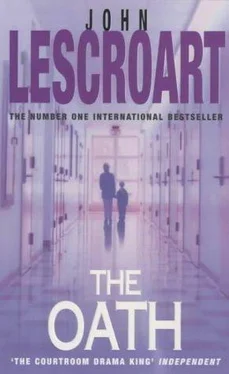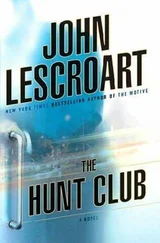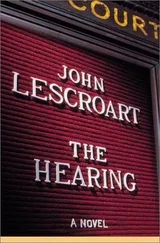"It's always warmer than here."
They both looked out the picture window, where the rain continued in sheets. The cypress trees that bordered the park were bent over halfway in the wind.
Abruptly, Hardy stood up. He pushed his unfinished martini to the edge of the bar.
"You leaving so soon?" McGuire asked him. "You just got here."
Hardy pointed to his drink. "If I finish that, and I desperately want to, I'll never leave."
"Fortunately, you don't have to."
"No, I do have to. I've got work and the devil's trying to give me an excuse not to do it. But I've got an idea for you and Susan. Why don't you get somebody to cover for you here and bring the kids over tonight. We'll take 'em. You guys go out. How's that sound?"
"It could work," McGuire said. "Though it isn't Mexico."
"Yeah, but what is?" Hardy laid a friendly punch on McGuire's arm. "Think about it."
***
Standing in front of the grand jury after a working lunch with Clarence Jackman and Abe Glitsky, Marlene Ash was in her element. The nineteen citizens gathered before her in the Police Commissioner's Hearing Room on the fifth floor of the Hall of Justice, one floor above Glitsky's office and two above Jackman's, cared mightily for justice to be done. They might appear to be a hodgepodge of humanity-certainly both genders and most of the ethnic populations in the city were represented here today-but Marlene knew that these people sitting now before her, and the others like them on juries (and not just grand juries) all over the country, were the backbone of the legal system she worked within. Without them, the "average" good citizen, justice would be an empty concept, the social fabric would tear.
So she played fair with them, respecting their intelligence and experience. "Ladies and gentlemen of the grand jury," she began. "On Tuesday, April 10, Timothy Markham began his customary, invariable morning jog. When he got to Twenty-sixth Avenue, here in the city, he was run down by a green, early model American car. The driver fled the scene in his vehicle.
"But the car accident is not what killed Mr. Markham.
"Instead, after he'd been somewhat stabilized after surgery at Portola Hospital, and as he lay helpless in his hospital bed, a person or persons as yet unknown injected his body with an overdose of potassium.
"Potassium is a common medication. It is readily available in emergency rooms and intensive care units. But potassium can kill when administered in large doses. And such a dose was given to Mr. Markham.
"That same night, his wife, Carla, and their three children died of gunshot wounds in their home. We have convened here today to take evidence to determine the identity of the killer or killers in this series of brutal deaths."
All eyes were glued on her. Most of the members had pads on the desks in front of them, ready to take notes. "The medical examiner has ruled that Carla Markham's death by gunshot is a possible suicide, but this is still a matter of uncertainty. Lieutenant Glitsky, the chief of the homicide detail, will be testifying here for you in a few moments. He will be conducting a parallel investigation into that aspect of the case, and he may decide to his satisfaction that in fact Mrs. Markham killed her family and herself, or he may arrest a suspect before you have gathered enough evidence to issue an indictment." She paused and met a few eyes among her jurors. "We'll cross that bridge when we come to it. In the meanwhile, the city has received a bill in the amount of thirteen million dollars for services…"
***
Hardy wasn't exactly sure what had brought him to Portola in the first place. He'd vaguely wanted to talk to someone in administration, he thought, but nobody would talk to him. He hadn't made an appointment-it was becoming his theme for the day. Everybody was busy, all the health care professionals and administrators were dealing with the fallout from the week's horrors within the hospital itself, to say nothing of the upheaval under the corporate umbrella. They had no time for impromptu meetings.
This whole day ought to teach him to rein in his boyish enthusiasm, he told himself as he squished down the hallway on his way to the lobby and out. He was just steeling himself for the dash outside when he noticed a sign that directed people to various locations, one of which read CAFETERIA.
Realizing that if he didn't ask no one could say no, he turned back and followed the arrows. It was long past lunchtime, and the place, while not deserted, wasn't crowded, either. Hardy grabbed a muffin and a cup of coffee, paid the cashier, and stood waiting for his muse to speak. Alone, at a table by a window, a woman in a nurse's uniform sat reading a book, and he began to walk toward her.
Closer up, he pegged her as between thirty and thirty-five. Nice looking, light brown hair worn short, medium build. "Excuse me," he said.
She kept her eyes on her book and held up a finger. After finishing her paragraph, she looked up. "Yes? Can I help you?"
Welcome words. But Hardy didn't know what if anything he expected to discover here by talking to her. But he'd never know if he didn't start. "My name is Dismas Hardy. I'm Dr. Kensing's lawyer. Do you mind if I sit down for a minute?"
A flicker of distrust faded as quickly as it had appeared. She lifted her shoulders, dropped them, and said, "Sure, but why? Am I in trouble?"
Hardy pulled a chair around across from her. "I don't think so. Should you be?"
It flustered her. "No! I mean, you said you're a lawyer. Usually aren't people in trouble when lawyers come visit them?"
"Now that you mention it, I suppose they are. This isn't one of those times, though." He handed her a business card and while she looked at it, he asked her name.
"Rebecca," she said. "Rebecca Simms."
"That's my daughter's name. We call her 'the Beck.'"
She nodded, somehow reassured, and she looked down again at the card. "Dismas? Is that right?"
He nodded. "The good thief on Calvary. Also the patron saint of murderers. I often wonder what my parents were thinking."
"So is Dr. Kensing in trouble?" she asked.
Hardy temporized. He blew on his coffee, set it down untouched in front of him. "The short answer is yes."
"Because of Tim Markham? Them calling it a murder?"
Hardy was thinking he'd picked the right table. "Exactly."
She shook her head disgustedly. "But that is so ridiculous. Murder. Please."
"Ridiculous in what way?"
"Well, I'm not saying it must have been an accident. Someone could have deliberately given him the wrong dose, I suppose. But we use potassium all the time in the ER."
"Are you an ER nurse?"
"Sometimes," she said. "We rotate a lot. I've been in there my share of times."
"And is the potassium pretty readily available?"
"Sure, to any medical person. It's right there behind the nurses' station."
From Hardy's perspective, this was good news if only because it gave more people-besides his client-access to the drug. "So in your opinion, an overdose of potassium wouldn't have to be deliberate? Or malicious?"
"No. They're usually not, in fact."
"They happen a lot?"
"Sometimes." She didn't seem too worried about it. "I remember we had one on this Saturday night near the end of last summer, there were some shootings in the Addition, and I think a car crash or two. Anyway, the ER was a madhouse, you can imagine. The doctor's yelling out orders right and left. One of the shot guys was bleeding out, his heart was failing, and he needed fluids with potassium, so he got one dose and before the doctor came back to him, somebody had given him another one, thinking it was the first."
"So what happened? Did he die?"
"No. The doctor recognized what was happening immediately. So he shocked him, then pumped him with insulin and glucose, and he came out."
Читать дальше












